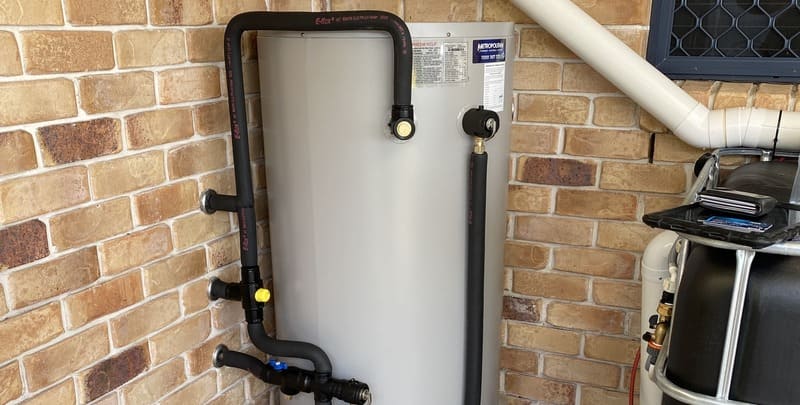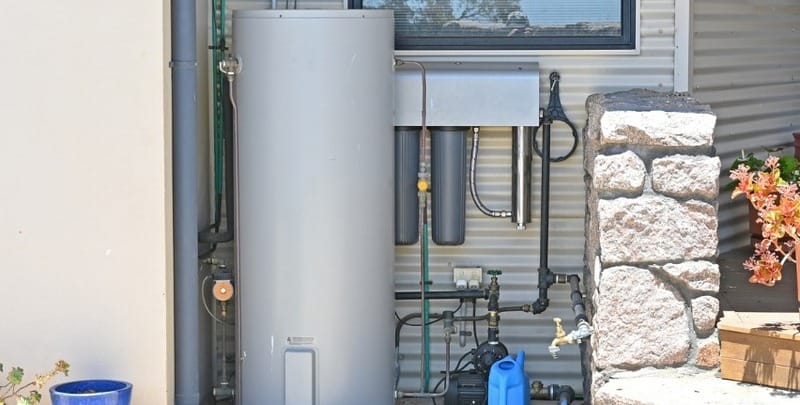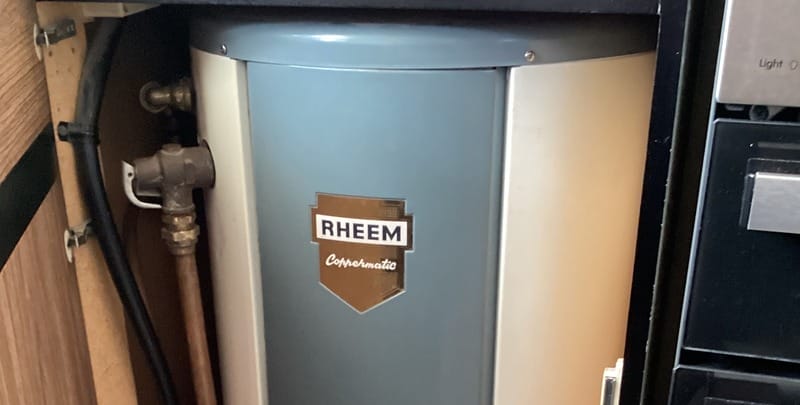
Can a Heat Pump Water Heater Be Installed Outside?
As energy efficiency and environmental consciousness continue to gain traction, homeowners are seeking innovative ways to reduce their carbon footprint while cutting down on utility bills. One such technology that’s been making waves is the heat pump water heater. But here’s the burning question: can you install it outside?
Heat pump water heaters operate by extracting heat from the surrounding air and transferring it to the water in the tank, making them highly efficient alternatives to traditional water heating methods.
However, the prospect of installing them outdoors raises some eyebrows. After all, outdoor installations come with their own set of challenges – from weather exposure to space constraints.
In this blog, we’ll delve into the nitty-gritty of heat pump water heaters, exploring how they work, the benefits they offer, and whether or not they can withstand the elements when installed outside.
We’ll weigh the pros and cons, consider important factors like climate and regulations, and provide practical insights to help you make an informed decision about the best placement for your heat pump water heater. So, if you’re contemplating going green with your water heating solution, stick around – we’ve got all the answers you need.
Understanding Heat Pump Water Heaters
Heat pump water heaters might sound like something out of a science fiction novel, but they’re actually pretty straightforward once you break it down. Imagine a refrigerator, but in reverse. Instead of pulling heat out of the inside to keep things cool, heat pump water heaters draw heat from the air outside and use it to heat water inside the tank.
Here’s how it works: a fan draws in air from the surroundings, and a refrigerant inside the system absorbs the heat from that air. This heat is then transferred to a coil filled with water, raising its temperature. Finally, the heated water is stored in a tank until you’re ready to use it.
One of the coolest things about heat pump water heaters is their efficiency. Because they’re not generating heat directly (like a traditional water heater does with gas or electricity), they use much less energy to get the job done.
In fact, they can be up to three times more efficient than conventional water heaters, which means big savings on your energy bills in the long run. Plus, since they don’t rely on burning fossil fuels, they’re also better for the environment.
So, while the technology might seem a bit futuristic, the concept behind heat pump water heaters is actually quite simple – and the benefits are clear.

Factors to Consider Before Installation
Before jumping into the decision of installing a heat pump water heater outside, there are several key factors you’ll want to take into account to ensure it’s the right choice for your home.
First and foremost, think about your climate. Heat pump water heaters work by extracting heat from the air, so if you live in a consistently cold or extremely warm climate, it may affect their efficiency. Additionally, consider the space requirements. Outdoor installations require adequate space and proper ventilation to ensure optimal performance and safety.
Local regulations and building codes also play a crucial role. Some areas may have specific requirements or restrictions regarding outdoor installations, so it’s essential to check with your local authorities before proceeding.
Another factor to consider is potential challenges. Outdoor installations may be more susceptible to weather elements, such as extreme temperatures, rain, or snow, which could impact the heater’s performance and longevity.
By carefully considering these factors and doing your research, you can make an informed decision about whether installing a heat pump water heater outside is the right choice for your home and location.
Benefits of Outdoor Installation
What are the advantages of outdoor installation? Let’s take a closer look:
- Space savings: Installing heat pumps outside can free up valuable indoor space, especially in smaller homes or utility rooms.
- Noise reduction: Heat pump water heaters can generate some noise during operation. By installing it outside, you can minimise the impact of any operating noise on indoor living spaces.
- Improved efficiency: Outdoor installations allow the heat pump water heater to draw in ambient air directly, without the need to compete with indoor air conditioning or heating systems. This can lead to improved efficiency and lower energy consumption.
- Extended lifespan: Heat pump water heaters installed outside are less likely to be affected by indoor factors such as humidity or lack of ventilation, potentially extending the lifespan of the unit.
- Potential for solar integration: Outdoor installations provide easy access to sunlight, which opens up the possibility of integrating solar panels to power the heat pump water heater, further reducing energy costs and environmental impact.
- Aesthetic considerations: Some homeowners prefer the look of outdoor installations, as they can blend in with landscaping or outdoor features, creating a more seamless appearance for the property.

Drawbacks of Outdoor Installation
Of course, there can be a downside to installing heat pumps outdoors, including:
- Exposure to weather elements: One of the primary drawbacks of installing a heat pump water heater outside is its exposure to weather elements such as rain, wind and extreme temperatures. This exposure can potentially impact on the storage tank and the performance and efficiency of the unit over time.
- Potential vandalism or theft: Outdoor installations are more vulnerable to vandalism or theft compared to indoor installations. Without proper security measures in place, the heat pump water heater could be at risk of damage or theft.
- Maintenance challenges: Accessing and maintaining an outdoor heat pump water heater can be more challenging compared to indoor units. Routine maintenance tasks such as cleaning or inspecting the unit may require additional effort and precaution due to its outdoor location.
- Limited space for installation: Depending on the layout of your property, finding a suitable location for outdoor installation may be challenging. Space constraints or landscaping features could limit your options and impact the installation process.
- Potential for noise disturbance: While outdoor installation can reduce noise inside the home, it may also lead to noise disturbance outdoors, especially if the unit is located near living spaces or neighbouring properties. Consideration should be given to the unit’s placement to minimise noise impact on surrounding areas.
The Installation Process
Installing a heat pump water heater outside requires careful planning and execution to ensure optimal performance and safety.
It is illegal to install a heat pump water heater without adequate qualifications, so here’s a step-by-step overview of how a licensed plumber would install a system:
- Site selection: A suitable location would be chosen for the outdoor unit, considering factors such as proximity to the existing plumbing system, accessibility for maintenance, and compliance with local regulations.
- Preparation steps: The site would be prepared by clearing any debris, levelling the ground, and ensuring adequate drainage to prevent water accumulation around the unit.
- Mounting and connection: The heat pump water heater would be mounted securely to a stable surface, such as a concrete pad or wall bracket. The unit is then connected to the existing plumbing system, ensuring proper alignment and sealing of all connections.
- Electrical connection: If the unit requires electrical power, it will be connected to the electrical supply according to manufacturer specifications and local codes.
- Safety measures: All necessary safety features, such as protective covers or barriers, will be installed to prevent accidents or unauthorised access to the unit.
- Testing and calibration: Once the installation is complete, the plumber will test the unit to ensure proper functionality and calibration. The professional will check for any leaks, unusual noises or other signs of malfunction.
- Final inspection: A final inspection will be conducted to verify compliance with all regulations and manufacturer guidelines. Any necessary adjustments or corrections will be made before finalising the installation.
By using a professional plumber for the installation, you can be sure your outdoor heat pump hot water system will comply with all regulations and standards.
Maintenance Tips
Outdoor heat pump water heaters, like any other appliance exposed to the elements, require regular maintenance to ensure optimal performance and longevity.
Here are some essential maintenance tips to keep your outdoor unit running smoothly:
- Regular cleaning: Keep the exterior of the unit clean and free from dirt, debris, and vegetation. Use a mild detergent and water to clean the surfaces periodically, especially after heavy rainfall or windy conditions.
- Inspect for damage: Routinely inspect the unit for any signs of damage, such as cracks, corrosion, or rust. Pay close attention to components like the casing, coils, and electrical connections, and address any issues promptly to prevent further damage.
- Protect from extreme weather: Take precautions to protect the unit from extreme weather conditions, such as installing a protective cover or shelter to shield it from direct sunlight, rain, or snow. This can help prevent damage and prolong the lifespan of the unit.
- Check airflow: Ensure that the unit has adequate airflow around it to optimise performance. Trim any overgrown vegetation or obstacles that may obstruct airflow and inhibit heat exchange.
- Inspect electrical components: Periodically inspect the electrical components of the unit, such as wiring and connections, for signs of wear or damage. Replace any damaged or frayed wires and tighten loose connections to prevent electrical issues.
- Schedule professional maintenance: Consider scheduling regular maintenance visits with a qualified technician to inspect and service the unit professionally. A professional can identify and address potential issues before they escalate, ensuring continued efficiency and reliability.
By following these maintenance tips and staying proactive in caring for your outdoor heat pump water heater, you can maximise its performance, extend its lifespan, and enjoy consistent hot water supply year-round.

Embrace the Great Outdoors
The question of whether a heat pump water heater can be installed outside comes down to careful consideration of various factors and weighing the pros and cons. While outdoor installation offers benefits such as space savings, noise reduction, and improved efficiency, it also poses challenges like exposure to weather elements, maintenance requirements, and potential for vandalism.
Ultimately, the decision should be based on your specific circumstances, including climate, available space, local regulations, and personal preferences. By thoroughly researching and consulting with professionals, you can make an informed choice that meets your needs and maximises the benefits of this eco-friendly water heating technology.
Whether you opt for an indoor or outdoor installation, proper maintenance is key to ensuring the longevity and efficiency of your heat pump water heater. Regular cleaning, inspections, and professional servicing will help keep your unit running smoothly and provide you with reliable hot water for years to come.
So, whether you choose to harness the outdoor elements or keep your heat pump water heater indoors, rest assured that you’re making a sustainable choice for both your wallet and the environment. With the right installation and maintenance practices in place, you can enjoy the comforts of hot water while reducing your carbon footprint.
Please note: This information is provided for advice purposes only. Regulations differ from state to state, so please consult your local authorities or an industry professional before proceeding with any work. See our Terms & Conditions here.
Published: 16 Apr, 2024